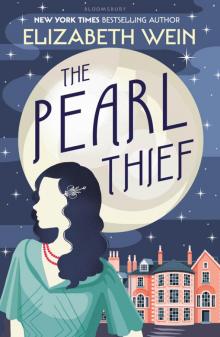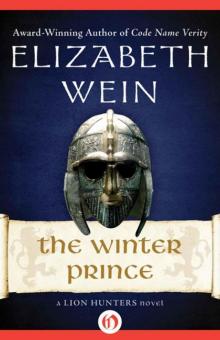- Home
- Elizabeth E. Wein
The Winter Prince Page 8
The Winter Prince Read online
Page 8
You spent the day there, admiring the songbirds and feeding bread crumbs to the peacocks. Fascinated as a moth courting a candle flame, I came home from the fields early and wandered about beneath the graceful cages. I tried to stay apart from you; but the Queen’s Garden is not very big. I forced myself at last to approach you where you sat on the grass among the peacocks, collecting the luminous and iridescent breast feathers that lay about. “When are you leaving?” I demanded.
You looked up with eyes the deep, sad gray or blue of a winter evening. “I will leave when the harvest is in,” you said, pulling a stalk of lavender to strip the buds from it one by one, crushing them between your fingers until the air around your hands was sweet with their sharp scent. “I will go to Venta Belgarum to see my mother and then back to the Orcades.
“Only be patient,” you added, stretching languid and catlike. “It is so gentle and warm here. It reminds me of the Summer Country in the south, where I grew up. It is cold in the Orcades.”
“Twenty miles to the east of here lie the High Peaks, and the country there is as cold and cruel as anything in the north,” I said.
“Ah, but you like the cold.” You brushed a peacock feather across my wrist and mourned, “Medraut, why did you not send me a pair of those beautiful African cats?”
“Oh, let be,” I said mildly, and turned toward the house. Lleu was walking down the steps from the colonnade, looking about him in wonder. He too had left the fields early.
“No. Stay. Sit by me.” You slipped your thin hand into mine to draw me down, and said conspiratorially, “I have been waiting for him. He’ll like it, don’t you think?”
Lleu made his way slowly from tower of hazel to palace of willow, slim brown hands brushing aside the snapping pennants, dark head bent or tilted skyward that he might mark each different bird. “I didn’t come down here this morning,” he called to you over his shoulder. “I only looked out through the atrium windows.”
“Do you like it, Prince?” you asked.
He walked across to us slowly, looking about him with shining eyes. “It’s lovely, Aunt!” he answered. “How did you think of it?”
“It’s easy enough to think of entertainment when you are idle as I am,” you said pleasantly. “Would you like me to tell you the names of the birds?”
“All right,” he said, but continued his own slow tour of the garden. Finally he made his way back to us and held out his hands to you that he might help you rise. You took them gratefully, gracefully, peacock feathers fluttering from your fingers. But as you rose one of your fingernails tore a raw scrape across the inside of his wrist.
“Oh, pardon!” you exclaimed, snatching Lleu’s hand to your lips so you might kiss the scratch.
He stood still and looked at you steadily. “My lady,” he said in quiet, “what did you mean by that?”
“An accident only,” you said.
“It was not an accident!” I cried, and made to stand. You halted me with one hand pressed to my shoulder, a silent order not to move. “Softer, my marksman, softer,” you said. “I can hear you.”
Th c="j noe breath of lavender hovered about your hand, and your red-and-black enameled bracelets clicked and clinked close to my ear. “You don’t do anything by accident,” I protested, but your hand on my shoulder held me powerless.
“Very rarely,” you agreed. Lleu stood before you, shorter than you, slight and dark. The peacocks milled about his knees. “Why, Prince, you have gone pale as salt!” You laughed.
Lleu swiftly turned away from you. He diverted himself as best he could, and ran his fingertips over the shining blue-black feathers of a peacock’s neck. Shy and ill at ease, he bent so that we could not see his face. I looked up at you and threw open my hands in an angry and silent query, but you did not even turn your head. “You are beautiful, Prince,” you said quietly to Lleu; “beautiful. I have never seen anyone so darkly beautiful.”
“Go away,” Lleu whispered without looking up. “Let me be. Why do you want to hurt me?”
“Dancer, swordsman,” you said. “Black hair and eyes so deep, so dark: prince of Britain, first and foremost in the high king’s sight. Are you not in every way my opponent? But for you, my son should have been heir to the high kingship.”
“Godmother, must you?” I interrupted in disgust
Lleu said irritably, “Medraut doesn’t want the high kingship.”
“I thought you might guess whom I meant,” you said smoothly. “Have you ever asked him?”
Lleu rubbed his wrist and said irrelevantly, “I hate these peacocks.”
“And me?” You smiled your incomplete smile.
He could not look at you directly. “I didn’t think I did,” he said. “But you seem to hate me.”
“Of course not, ridiculous child,” you answered. “Come, I will walk with you up to the villa.” You offered a supporting arm to him, and he took it as though in a bewildered dream. “I shall tell the king,” he said desperately.
“What shall you tell him?” you said. “You have nothing to tell him, Bright One.” You turned his wrist over and ran your fingertips across the scratch you had given him. “Shall I salve this for you?”
“Oh: don’t touch it,” Lleu said. He pulled away from you and almost ran inside, stumbling a little. I scrambled to my feet and started to follow, but you caught my sleeve and held me back. “I said to stay,” you repeated. “The little sun prince can survive a while without your protecting hand over his head.”
I said sharply, “Indeed, why did you hurt him?”
“He neglected my child cruelly. I am only trying to punish him a little.”
“It was a game. He has asked forgiveness and been forgiven. Why must you go on and on?”
“You thwart me, Medraut,” you said quietly. The caged birds chattered and fluted over our heads. “You turn my threats aside.”
I said through my teeth, “Godmother, I am struggling to keep peace in this house, and I hope you do feel thwarted.”
You laughed again, and did not answer.
I found Lleu later, asleep on one of the wide windowsills in the still sunshine of the atrium, curled with c, c width="2e his head cushioned on his hand and one of the cats dozing in the bend of his knee. Lleu asleep: and we had not been in the fields a full day. I bent to wake him, asking, “Nothing’s wrong?”
He sat up stiffly, and the cat leaped away. “There couldn’t be,” he said. “I haven’t eaten our own food in four days.”
“But you’re still so tired.” I sat next to him on the stone sill.
“I think it is Morgause. I think her very touch must be poisonous,” Lleu said, angry and weary, rubbing his wrist. “Could one do that?”
I smiled. “In hunting some people do use poisoned darts or spears. But a touch will not suffice; the skin must be broken.”
My words caught in my throat, and for a still moment Lleu and I looked at each other in a kind of mute horror. Then Lleu slowly turned his wrist over and held it before me. Shadows cast by the dull lead traceries of the window and light from the stippled, glinting glass panes mottled and slashed his bare arm. The narrow scrape there was barely deep enough to have bled, but the skin around it was red and hot to touch. I took Lleu’s hand and held the scratch to my lips. “It smells of lavender,” he said. “That wouldn’t put me to sleep.”
“No, it wouldn’t.” It smelled of aconite. The lavender did not hide it.
Lleu rubbed his eyes, and murmured, “I am very tired of this.”
“I too.” I snorted a little, wanting to sneer. Poisoned nails! You are exquisite, Godmother.
It was too late to go back to the fields, and there was no way for us to avoid eating supper with the rest of the family. We had scarcely been seated before you turned your slate-cold gaze on Lleu as he lifted his cup to drink. I leaped forward to knock his hand aside, and sent his cup flying across the atrium to smash against the windowsill in a storm of earthenware and cider.
Artos started
up and struck the table with a blow that rattled the dishes. He thundered, “What the devil is the matter with you, Medraut?”
No answer came to mind. I stood before Artos without any excuse for my conduct.
“Medraut must think the cider’s bad,” Goewin said suddenly, breaking the awkward silence. “One of the bottles was off this morning.”
“That’s not true,” I protested weakly.
“I tried it myself,” Goewin insisted with careful and precise deliberation, looking directly at me as she spoke. “Though I may have been mistaken. Why take the chance?”
I clenched my hands to keep them from shaking. It was as close as I had ever come to lying. Ginevra said gently, “You’d better clear away the mess, Medraut.”
Naked to the waist after a day at the gleaning, I climbed among the red stones of the Edge far above field, village, and estate. I came upon Lleu drinking and washing his hands in the Holy Well, the shadowed stone trough high among the trees and rocks. The water was so dark I could not see his hands in it. “Need you come this far to drink?” I asked, and he answered me, “I think our well is poisoned.” He drew his hands out of the spring, but the water that dripped from them was deep red, not clear. “You’re bleeding!” I said, but he did not seem to hear. I made him turn around to face me, and his skin was white: not pale, but a dead, c bu1D;unreal white, like quartz or the moon. When I reached to take his hands his touch was cold and lifeless as stone. “You’re dying,” I whispered, and as I spoke he crumpled slowly to the ground.
Someone spoke my name in a low and urgent voice. I did not turn around, though I knew you stood behind me. “Medraut,” I heard again, and a touch on my bare shoulder. I shook you off. “Godmother, no,” I whimpered. My name again. Your touch.
Then a streak of pain fierce across my shoulder, as though I had burst into flame.
I cried out, “Curse you, lady!” and found myself in bed in my own room in the villa, risen on an elbow with one hand pressed to my shoulder. A dream. Only a dream. But the burning pain—
“Medraut, it’s me,” Goewin said. “Goewin. Goewin—not who you think.”
I stared, only half-awake. Goewin stood a few steps away from me; when I woke she had shrunk back, startled. The little earthen lamp she held quivered in her hands, and lamp oil, cool now, was smeared across my shoulder. I thought she had burned me on purpose, to waken me. “You grow ruthless at last,” I breathed. “I had not thought I must answer to two sphinxes: there is only supposed to be one.”
Goewin asked unsteadily, “What is a sphinx?”
“A teller of riddles,” I murmured as I examined the burn, “with a lion’s body and a woman’s head. She devours young men.”
“I’m sorry,” Goewin pleaded, a guilty Psyche unsure of what she had awakened. She knelt by my cot and said in a low and fervent voice, “You were sleeping curled with your back against the wall and your fists in knots, so deep in a dream I could not wake you. Ai, Medraut, you sleep as though you are in pain! I moved too quickly, and the lamp spilled, but it was an accident. I would never hurt you, never.”
“Pass me the robe hanging over the chair,” I said. She handed it to me, and looked away as I put it on.
“Is the burn all right?” she asked.
“Don’t apologize again,” I said, almost amused at her distress. I stood up and went to the open window to press my shoulder against the cold and soothing stone. The night outside smelled cool. Goewin stood behind me in the dark, trying to hold her little lamp steady. “What did you come here for?” I asked.
“Lleu is poisoned again,” she said. “He woke me on his knees by my bed in such agony as I have never seen him. I could not make him get up. He thinks he is on fire.”
I turned to face her. “How? What does he mean?”
“His mouth, his eyes, he says they burn. All inside him—”
“It will be spurge,” I said. “I need milk. And get a better light.” Automatically I began to ransack my shelves for an appropriate antidote, though I am ill supplied against anything so sinister and incomprehensible as your mind working in idleness and anger.
Lleu was in Goewin’s chamber, crumpled on the floor next to her bed just as she had left him. He clung to the tapestry that hung there as though he were trying to support his weight against it. I had to pry the woolen folds from his fingers. When I forced him to let go he clutched at my own hands with the iron grip of desperation, and I could hardly shake him off long enough to set down the armful of bottles that I c ctlewitarried. I finally had to tie his hands. Then he managed to gasp in protest, “Oh: no.” It seemed unspeakable that he should be made to endure such anguish, whatever the crime.
When the worst of the night was over Lleu cried out softly, “What is happening to me? I am being used as a pawn, a plaything—”
“How could it have happened?” Goewin said. “You had nothing to drink at supper.”
“I had water afterward,” Lleu said. “I may not have watched my cup closely enough.”
“Surely you could taste spurge in water?” I said in wonder. “Ah, never mind. You’d already been bemused by aconite. Can you sleep now, little one?”
“I will try,” Lleu said.
“Then good night,” I said, gathering the vials littering the floor. “I will tell your father tomorrow. This—this is beyond my control.”
I saw Lleu to his room, then went back to my own and scattered the debris of bottles and herbs in a disordered pile on my desk. The night was half gone. I was supposed to be at the copper mines just after sunrise, but I was determined I should speak to Artos before the day began. Sleep held only the promise of another nightmare. Instead of going back to bed I sat in the corridor before the door to my father’s chambers, to be there when he woke. The stone floor was cold, the door hard against my back; the little burn on my shoulder had blistered so that now it stung and smarted. I drew my knees up against my chest and imagined I could watch there until morning.
Another dream.
I am alone in an abandoned garden. The stone walks are cracked and decaying; sweet flowering vines trail among the ruined roses, verdant beneath a sky of distant sapphire. But beyond the garden walls the land stretches cracked and desolate, sere earth and red rock. An arid river courses down the slope below the garden. I am in the south of Egypt, I think; if I follow the riverbed, I will find the Blue Nile and the high slopes and thin, clear air of Aksum. There is a figure sitting cross-legged on the bank of the dry river, the desert at his back, and I am surprised that in this land of dark-skinned people he is almost fair as I. When I approach to ask my way I find it is my brother. “This is not Africa,” he tells me. “Do you not recognize the Mercian plain?”
And it is so. I can make out Shining Ridge and the Edge, though the forest is gone. “Where are the trees?” I ask.
He does not answer. He is bleeding again, as in the first dream, but this time from a wound in his side. Then it is not Lleu son of Artos, the prince of Britain, but Lleu Llaw Gyffes his namesake, the Bright One of the Steady Hand. Maimed and betrayed and enchanted, his hands become talons and his eyes grow round and gold: he is suddenly an eagle circling above my head and screaming.
It was Goewin screaming, and I was awake, huddled on the cold floor of the corridor. Artos stood in the doorway of his apartment, and Ginevra slipped past us with a lighted candle. I stood up quickly. “What in heaven’s name is going on?” Artos demanded. Through the open door of Goewin’s chamber we could hear Ginevra speaking in low tones of reassurement, and Goewin answering with shaking, muffled sobs. “What’s wrong?” Artos called.
“A bad dream,” Ginevra answered. “She is all right.”
Artos turned to me. “My brave Goewin wakes screaming from nightmares,&#x cigh#x2201D; he said evenly and quietly. “Lleu can barely stay awake for two hours together, and I find you lurking outside my door in the middle of the night.”
He paused, seeming to expect an answer, and I said uncertainly, “I must speak with you
.”
“If you were going to wait till morning you might have found the waiting easier in your chamber than in the corridor.”
I looked down in apology.
“We can speak now,” Artos said.
We went into his study. Artos sat at his desk and I lit the fire, glad to have some reason to occupy my taut hands, and glad of the extra time to think of how I must tell my story. “You haven’t been sleeping well,” Artos observed.
“No,” I admitted.
“Sit down,” he said.
“Thank you, sir.” I sat, with my hands held carefully still on my knees; and then, without expression or bias, I told the king what you were doing to Lleu. Artos listened with equal reserve, without surprise, as though listening to a story about other people in another place and time.
“The simplest thing to do would be to send her away,” I finished. “There need be no explanation, and there will be no scandal. No one in Camlan need know why she is leaving.”
“Do you have proof of her treachery?” Artos said.
“Not beyond her own dark hints,” I answered. “But someone is doing it, and it is like her. It is like something she once did to me.” I spoke with difficulty, trying to be candid. “I grew to know her very well, the two years I stayed with her. She can be very cruel. I know there is no love between you, and I can’t see that she has any reason to love your children.”
“Has she reason to hate them?” Artos said quietly. “Well, it is true that she toys with people. When did this start?”
“I think it was the night Lleu fell asleep on the porch, and you had to carry him to bed,” I answered. “It was raining.”
Artos leaned forward, his hands clasped together on his desk, his expression still unbiased but his voice unforgiving. “That night you told me, when I asked you directly, that there was nothing wrong with Lleu,” he said. “Were you lying then, or now, and to what end? And if you’ve been suspecting her of tormenting Lleu, why didn’t you come to me at once?”

 The Pearl Thief
The Pearl Thief Cobalt Squadron
Cobalt Squadron The Empty Kingdom
The Empty Kingdom Code Name Verity
Code Name Verity Rose Under Fire
Rose Under Fire A Coalition of Lions
A Coalition of Lions Black Dove, White Raven
Black Dove, White Raven The Winter Prince
The Winter Prince The Sunbird
The Sunbird